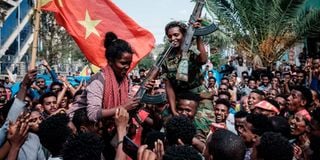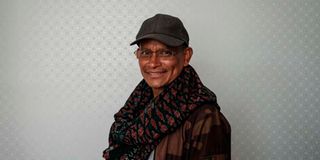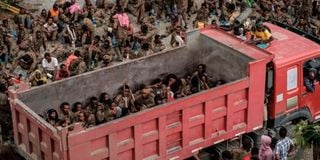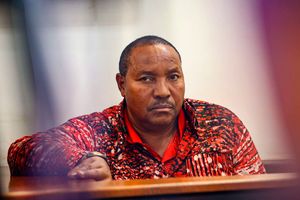Premium
Ethiopia crisis: Tigray forces issue ceasefire conditions

Female soldiers of Tigray Defence Force (TDF) celebrate while sitting on men's shoulders as people celebrate their return on a street in Mekelle, the capital of Tigray region, Ethiopia, on June 29, 2021.
What you need to know:
- TDF set several conditions including an immediate withdrawal of all Ethiopian and foreign troops, as well as compensation for infrastructural and other damages inflicted in the region.
The Tigray Defence Force (TDF) in Ethiopia, that retook regional capital, Mekelle, from central government forces, has issued several strict conditions for a truce.
Shortly after Mekelle was captured on Monday afternoon, the Ethiopian government announced a unilateral ceasefire.
A day later, however, Tigrayan forces categorically ruled out a truce, with a spokesman of the Tigray People's Liberation Front (TPLF), Getachew Reda, saying their forces would keep fighting until the Ethiopian military and its allied forces completely withdrew from the region.
However, in a statement issued Sunday, the restored Tigray government said that as long as an ironclad guarantee is secured to ensure the people of Tigray don't suffer any new invasions, "we accept a ceasefire in principle".
It set several conditions including an immediate withdrawal of all Ethiopian and foreign troops, as well as compensation for infrastructural and other damages inflicted in the region.
"Invading Amhara and Eritrean forces must withdraw from Tigray and return to their pre-war territories" the statement said, adding Eritrean forces must leave the country immediately.

Debretsion Gebremichael, president of Tigray's pre-war government, poses for a portrait in Mekelle, the capital of Tigray region, Ethiopia, on July 1, 2021.
United Nations probe
TDF also wants the United Nations to investigate alleged atrocities by Ethiopian and Eritrean forces that had been deployed to the region.
It called for UN to establish an independent investigation team to probe forms of human right violations including war crimes, crimes against humanity and gender-based violence.
Since the Tigray conflict erupted in November 2020, over 1,500 rape cases have been reported across the region.
The Tigray forces also want unrestricted aid distribution, safe repatriation of displaced persons and refugees and the return of all looted private and government properties.
They also demanded respect of the Constitution, citing the former TPLF regional government as the only democratically elected government in Tigray.
In this regard, the forces asked the federal government to accepts the fact that the Constitution is the sole basis for any negotiations going forward, and enable the democratically elected government of Tigray, with all its powers and constitutional responsibilities, to take charge again.
To effect its governance, TDF demanded that the federal government releases all withheld budget for the region.
Another condition is the release of imprisoned Tigrayan former members of the Ethiopia National Defence Force (ENDF), who are currently languishing in several prisons.
TDF further said “no members of the National Defence Force will be allowed to enter and operate in Tigray".

Wounded captive Ethiopian soldiers arrive on a truck at the Mekelle Rehabilitation Center in Mekelle, the capital of Tigray region, Ethiopia, on July 2, 2021.
Suspended services
TDF sought compensation for damages inflicted by ENDF and its allied Amhara and Eritrean forces in the past eight months.
After TDF took control of Mekelle and all other key cities, telecommunication, electricity, banking and other basic services were reportedly cut off in the region.
According to aid agencies, there are no fuel or food inputs into the region and there is a shortage of cash.
One condition urges the government to fully restore all halted services as well as air transport and says that there should be no further interruption.
The United Nations High Commissioner for Refugees (UNHCR) has called for the reopening of Mekelle and Shire airports.
"The humanitarian situation in Tigray is deteriorating," UNHCR said on its Twitter account, stressing that urgent assistance was needed.
It also called for the provision of electricity and communication services in addition to air transport for aid agencies to be able to reach the people.
Finally, it said: "The government of Tigray considers creation of an independent international entity, entrusted with the task of following up on the implementation of these preconditions for a ceasefire, be a non-negotiable element of the ceasefire itself."
People carry flags for Tigray's pre-war government (left) and the Tigray People's Liberation Front (right) as well as a portrait of its pre-war President, Debretsion Gebremichael, as captive Ethiopian soldiers walk towards Mekelle Rehabilitation Center in Mekelle, the capital of Tigray region, Ethiopia, on July 2, 2021.
Organisations jittery
Josep Borell, the European Union's foreign and security chief, said: "A ceasefire doesn’t mean cutting a region off power or destroying critical infrastructure.”
"A credible ceasefire means doing everything possible so that aid reaches the millions of children, women and men who urgently need it. Saving lives should be a priority for all" he added.
Commenting on the suspended services, Deputy Foreign minister Redwan Hussein asserted that the government will not resume banking services because the organisations will not operate without a guarantee.
More on this: Ethiopia PM says Eritrea to withdraw troops from Tigray
Also read: US issues warning to aircraft in Tigray
Regarding telephone and electricity services, he recalled that the TPLF had previously killed engineers who had gone to Tigray to repair electricity and telephone lines.
"As long as TPLF continues to commit these killings, it will be difficult for the government to provide electricity and telephone services," he said.
In the case of aviation, he said UN aircraft will be provided with adequate support on arrival in Addis Ababa and upon departure.
The minister stressed, however, that the Ethiopian government will conduct careful inspections upon arrival and departure of the planes.
He further said the Ethiopian government will not be responsible for any attacks carried out on aircraft in the region.
The UK government says the humanitarian crisis in Tigray has worsened, with 5.2 million people needing food and at least 353,000 at risk of starvation.
More than two million people still do not have access, according to UK government’s latest report.





